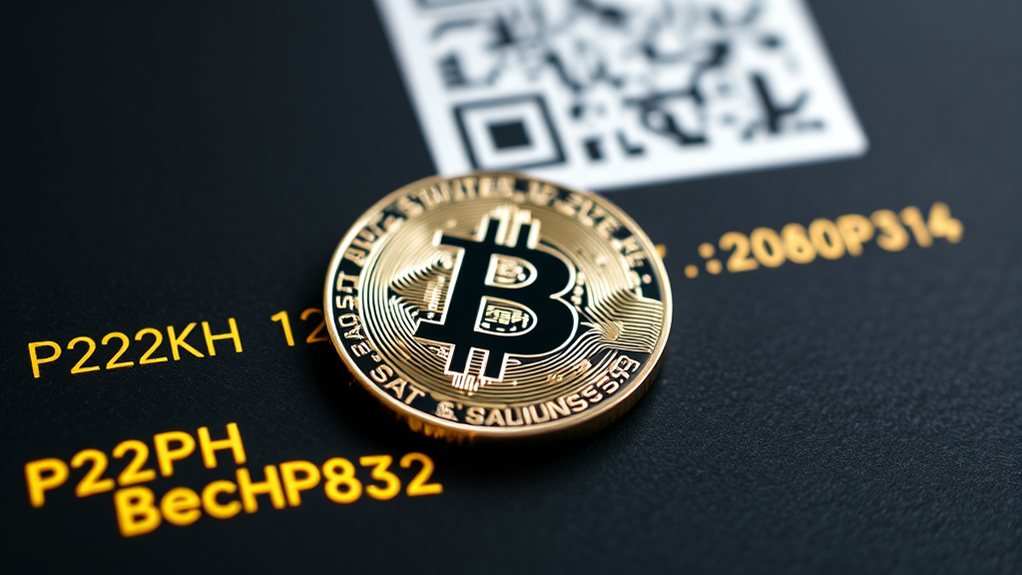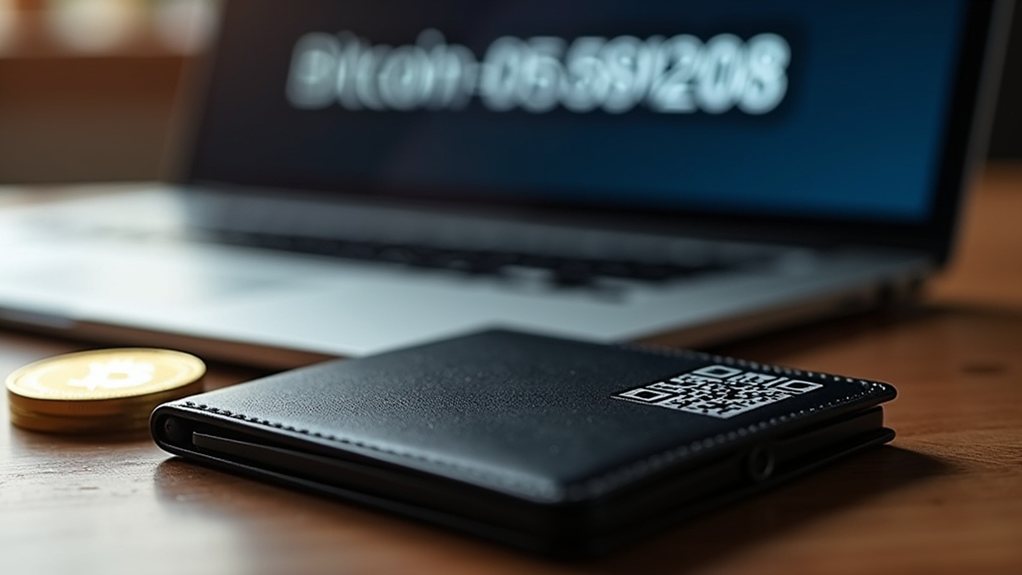A Bitcoin address is an alphanumeric string of 26-35 characters that serves as a digital mailbox for receiving Bitcoin. It typically starts with 1, 3, or bc1 depending on the format type. These addresses are created through cryptographic processes involving private and public keys. They include built-in checksums for security and can be displayed as QR codes for easy scanning. Different address formats offer varying features for transaction management and privacy protection.

What exactly is a Bitcoin address? It's an alphanumeric string of 26-35 characters that serves as a destination for receiving bitcoin. These addresses typically start with the number 1, 3, or the letters bc1, depending on the format. They work like digital mailboxes where people can send bitcoin. Many users also display their addresses as QR codes for easy scanning with mobile devices. Unlike bank accounts, bitcoin addresses aren't directly linked to personal identities.
The process of creating a bitcoin address involves several cryptographic steps. First, a private key generates a public key. This public key then undergoes hash functions to produce the actual bitcoin address. These addresses include a built-in checksum that helps detect typing errors when someone enters an address. Users can create unlimited unique addresses from a single wallet. Having a Bitcoin wallet is essential as it stores private keys needed to access and manage your cryptocurrency on the blockchain.
Creating a bitcoin address transforms private keys into public ones through cryptographic processes, with built-in error detection for maximum security.
Bitcoin addresses come in different formats, each with specific features. The oldest format starts with the number 1 and is called P2PKH or Legacy. Addresses beginning with 3 are P2SH format, which allows for more complex transactions. The newer Bech32 format starts with bc1 and offers lower transaction fees. The latest Taproot addresses begin with bc1p and provide enhanced privacy and efficiency.
Security features are built into every bitcoin address. They're case-sensitive to prevent typing mistakes. The checksum helps users avoid sending bitcoin to invalid addresses. It's worth noting that while someone can see the balance of any public address, they can't access those funds without the private key. The address creation process is one-way, meaning no one can work backward from an address to find the private key.
In transactions, users enter the recipient's address when sending bitcoin. The network decodes this address to determine how to lock the funds. Miners then include this transaction in a block. When complete, the recipient's wallet detects the incoming funds. Bitcoin transactions often generate change addresses to return unspent funds to the sender.
Most bitcoin wallets handle address management automatically. They can generate multiple addresses for users, often creating new ones for each transaction. This practice enhances privacy by making it harder to link transactions to the same user. Wallets also create change addresses automatically when users don't spend their entire balance.
The bitcoin address system represents the foundation of how users interact with the network. It allows people to receive funds without revealing personal information. While addresses appear complex, wallet software handles most technical aspects for users. The system balances user-friendliness with the robust security needed for digital money. As Bitcoin evolves, address formats continue to improve with new features while maintaining compatibility with the core network. Lightning Network addresses introduce another format starting with "lnbc" for faster transactions outside the main blockchain.
Frequently Asked Questions
Can I Change My Bitcoin Address?
Yes, users can change their Bitcoin address. Wallets typically generate new addresses automatically for each transaction. This practice enhances privacy and security.
Most wallets feature a "Receive" function that provides fresh addresses. Old addresses remain valid but using them reduces privacy. The process is instant and doesn't affect the wallet's balance.
All previously used addresses continue to work and remain accessible within the wallet.
Is My Bitcoin Address Linked to My Personal Information?
Bitcoin addresses aren't automatically linked to personal information. They work as pseudonyms on the blockchain.
However, exchanges collecting KYC information do connect addresses to identities. When someone uses an exchange, their withdrawal addresses become tied to their verified identity.
Blockchain analysis can sometimes reveal who owns which addresses by studying transaction patterns.
Privacy techniques like using new addresses for each transaction can help maintain anonymity.
How Many Bitcoin Addresses Can One Person Have?
There's no limit to how many Bitcoin addresses one person can have.
The Bitcoin protocol allows users to create billions of unique addresses instantly at no cost. Many wallet applications automatically generate new addresses for each transaction to improve privacy.
People often maintain multiple addresses for different purposes, such as separating personal funds from business transactions or creating cold storage for long-term savings.
What Happens if I Send Bitcoin to the Wrong Address?
If someone sends Bitcoin to the wrong address, the outcome depends on the situation.
Sending to invalid addresses usually fails, and no funds are lost.
However, if sent to a valid but unintended address, the transaction completes and the funds are typically unrecoverable.
Bitcoin transactions can't be reversed.
The sender's only hope is if they've sent to their own wallet or if the recipient willingly returns the funds.
Are Bitcoin Addresses Case-Sensitive?
Some Bitcoin addresses are case-sensitive while others aren't.
Legacy addresses (starting with "1") and Nested SegWit addresses (starting with "3") are case-sensitive.
Newer formats like Native SegWit (starting with "bc1q") and Taproot (starting with "bc1p") aren't case-sensitive.
Case sensitivity affects error detection in different address types. Users often copy-paste addresses to avoid mistakes that could lead to lost funds.














